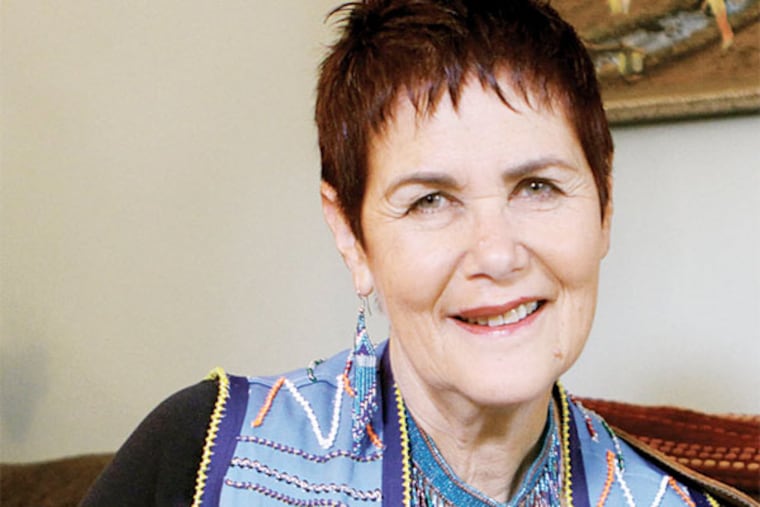Love on the tracks
In 1993, in South Africa, musician Sharon Katz gathered together 150 musicians and 500 children from all ethnicities.

IN 1993, in South Africa, musician Sharon Katz gathered together 150 musicians and 500 children from all ethnicities in the country and set out on a journey to promote peace and racial harmony that continues to this day.
"I founded the Peace Train to be the face and voice of Nelson Mandela," she said recently of the anti-apartheid leader who became South Africa's first democratically elected president in 1994.
Katz has spent the last two decades advocating for peace and nonviolence through song, first in South Africa and then across the world. She's been nominated for a Grammy and recorded with artists like Elton John and Tina Turner.
She now lives in Philadelphia, where she plays her music for high-school and college kids, prison inmates - whoever needs to hear her message of nonviolence. Her activism is being chronicled in a documentary, "When Voices Meet," currently in production.
An empathetic heart
Katz developed compassion at a young age, growing up in Port Elizabeth, South Africa. On 300-mile drives to her grandparents' house as a child, she would watch the impoverished black towns out of the car window and wonder why the people there had to live in such bleak conditions.
Katz's family was Jewish, so she wasn't a stranger to prejudice. Her grandfather had escaped Russia during World War II, and her father told her about anti-Semitism that he faced in South Africa.
As a teenager, Katz would sneak into black-only townships by hiding under a blanket in the back of a friend's car. She saw the oppression there, but she also witnessed small acts of rebellion.
One vivid memory: During a play by John Kani, a playwright and actor whom she had befriended, actors stood up and sang the banned South African national anthem.
"Those experiences are what shaped me," she recalled. "I thought, 'Wow, I want to be friends with those people.' "
In the 1980s, Katz came to Philadelphia to study at Temple University for a master's degree in music therapy. She did an internship in a mental ward in the Philadelphia prison system.
"I was very, very fortunate to come here," she said.
A song of democracy
Armed with her degree, Katz returned to South Africa in 1993 and formed the Peace Train band when she was 34. She hoped that she could encourage the different races to unite, dance and appreciate their country's music. It was a pivotal time, as Mandela had been released from prison in 1990 and was leading a movement for the country's first multiethnic elections. Katz met Mandela after his election in 1994.
"You embody the nonracial democracy we've been striving for," she recalled him saying. Mandela invited Katz to play at his speeches. He also asked her to compose songs that would teach the newly democratic populace how to vote. In April 1994, CNN captured video of Katz helicoptering into a rural village to play her voting-instructions song. That footage propelled Katz into the international consciousness. She began to receive invitations from other countries to tour with her music.
She brought 45 musicians with her for a five-week, eight-city U.S. tour in 1995. The group also recorded an album, "Carnival," with Turner, John and others.
Tracks to Philly
Katz moved back to Philadelphia in the early 2000s. She realized she had a power not many possess: a large platform and the talent to preach peace across the globe. She formed a new band in the U.S. and started working with troubled populations here and abroad.
"Some audiences have been tough nuts to crack," she admitted, though she said she almost always gets them up and dancing with her band, which peppers funk, Latin and R&B rhythms with a South African-based sound.
She does anti-violence workshops, often drawing on South Africa's horrific apartheid years and asking students about parallels in their own lives. There are music and dance workshops, too.
Katz has been at the peace game for almost two decades. This year marks the 20th anniversary of her Peace Train tour, and next year will be the 20th anniversary of Mandela's election.
By the end of 2013, she hopes to release the documentary, about her original train tour through South Africa and featuring current-day interviews with members of her first, 500-voice children's choir. The film's title, "When Voices Meet," is also the name of her first show in 1993.
"It's a unique project that doesn't come along too often," said Rob Stoller, director of the documentary, now being edited. Mandela's in it, and there's good archival footage of the original Peace Train tour.
It's not an exaggeration to say that the original Peace Train tour is still touring. Katz just returned from Madison, Wis., and is on her way to North Carolina and then Colorado.
"Sharon Katz and the Peace Train have had a discernible, measurable impact on so many people," Stoller said. "She's able to communicate with many, many people through her music or through her personality."